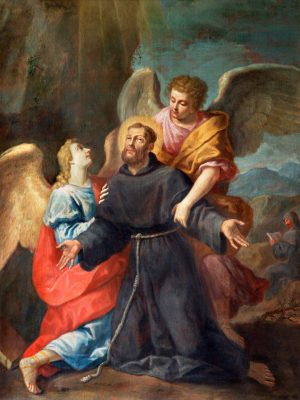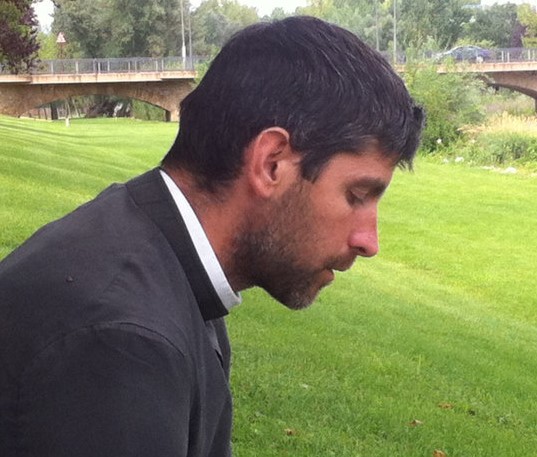“Abram habitávit in terra Chánaan: Lot vero morátus est in óppidis, quæ erant circa Iordánem, et habitávit in Sódomis” (Abram dwelt in the land of Chanaan, and Lot abode in the towns that were about the Jordan, and dwelt in Sodom)
-Genesis 13:12
Is it better to strive to enter the narrow gate to heaven dwelling in the country or the city? For each person this will be a different answer. It seems at a glance that the choice is to dwell in the country. For Abraham the story ends well and for Lot the story ends in destruction. But how is one to live in this time?
Very few know about the story of St. Simeon, Bishop and Martyr (Feast February 18th). He was a cousin to Jesus. He was most likely one of the 120 who received the Holy Spirit at Pentecost. When the Jews massacred St. James the Lesser, his brother Simeon reproached them for their atrocious cruelty. St. Simeon was unanimously chosen as successor.
After being accused a Christian by certain heretics and Jews before Atticus, the Roman governor in Palestine, the saint was condemned to crucifixion. What was remarkable about this saint is that he endured the normal sufferings of crucifixion at the age of one hundred-twenty! Suffering in this way those last days of his life drew universal admiration, and that of Atticus in particular. St. Simeon died in 107. He must have governed the Church of Jerusalem about forty-three years.
The question might be asked: “Was it good that he lived in the city?” Obviously. His episcopacy was used to draw countless souls to Christianity. God wanted him to govern the See of Jerusalem influencing numbers of people during the forty-three years of governance.
But the real question is this: “How do I know where God wants me to live?” The answer to this requires the soul to be quiet in order for God to direct the heart where God wants her planted so she will flourish.
There are different schools. The Carthusians, Cistercians and some Benedictines prefer monastic life in the country; whereas, Dominicans, Franciscans, and Augustinians, dwell most frequently in the cities.
This pivots to the perfect apostolic life and contemplation; very important questions related to where a person is called to be. After reading this article, hopefully the soul will have more information to discern this question.
“From the fullness of contemplation proceed teaching and preaching” (St. Thomas, IIa, IIæ, q. 188, a. 6). One thing the author feared most while growing up in grammar school was public speaking. Was the devil putting fear in his mind? But now he is a priest who teaches and preaches what he contemplates. Dominicans, Franciscans and the like teach, preach and direct souls.
They are devoted to the apostolic life. Carmelites and other contemplatives observe abstinence, fasts, night rising, profound study of philosophy and theology, Divine Office in choir, and lastly the apostolate through oral or written teaching and preaching. Those devoted to the monastic life with God alone do not have an outside apostolate per se, even if they write.
What is the eminent source of the apostolate? Fr. Garrigou-Lagrange proposes the answer: “The apostolic life should resemble as closely as possible that of our Lord and of the Apostles…”
The great missionaries were men of deep prayer. Preaching proceeds from the fullness of contemplation says St. Thomas. St. Peter is a chief example: Jesus, who “…you by the hands of wicked men have crucified and slain. Whom God hath raised up.” (Acts 2: 23).
Fr. Garrigou LaGrange writes:
“The eyes that gaze openly upon divine things are those employed in the loving and penetrating contemplation of revealed mysteries, a contemplation superior to the exterior practices of penance and also to simple study. It is the contemplation which, together with profound love of God and neighbor, should be the soul of the apostolate.”
Imitation of Jesus Christ and the Apostles is the soul of the apostolate. Today there is ever a greater need for contemplatives to give the fruits of their contemplation to others. But this simple reality is hard to realize because the modernists have influenced not a small number of the faithful.
One of the errors is that love of neighbor is superior to love of God. This heresy, which is alive and well, has overthrown the very order of charity. It is a surreptitious spirit that sows phrases in the minds like, “We don’t perform those old traditions because the people will not understand.”
But for the Church to triumph over her foes, it needs to be reiterated that there is nothing more sublime on earth than union with God. Missionaries that breathe this reality at every moment have the greatest apostolic fruit, for union with God is the eminent cause of any real growth in the conversion of souls.
History records that every good thing in the Church started with contemplation. Religious communities, pious associations of the faithful, new movements from God all have a common source; namely, contemplation.
But Christ was not simply content with the contemplative life, St. Thomas says, but chose that which comes from a superabundance of contemplation and came down to men to share the love of the indwelling of the Holy Trinity (Cf. IIIa, q. 40, a. I ad 2um; a. 2 ad 3um.)
God willed contemplation and union with God, not as subordinated to action, but as fructifying in the apostolate. Perhaps the devotion to the Holy Face of Jesus is becoming more known at an accelerated pace as a means to go back to the basics in the apostolate.
Sr. Mary of St. Peter received revelations from Jesus that constitute the Archconfraternity of the Holy Face, approved in 1885 by Pope Leo XIII. The crux of this devotion is to focus on restoring the rights of God again. Contemplation of and ardent love for the Holy Face of Jesus can only revitalize the apostolate because it brings a great spirit of faith from an ardent love for God and souls.
An ardent love for God will also grow through an authentic love of mental prayer and a reverent celebration of the Holy Sacrifice of the Altar. The very threshold of grace flows from the Holy Altars, but there needs to be a renewed sense of the awe found in the ancient rites so that nothing novel interferes with the sense of the faithful. The soul in love with God when seeing the Latin Mass for the first time, just knows she has found the living treasure, the fount of divine grace.
The Church was given to us by Jesus Christ to render authentic worship to God. In a word, God knows how He wishes to be worshipped and through this worship how to bring souls to heaven. Authentic fruits in the apostolate are directly related to authentic worship.
The fruits of the apostolate should be the conversion of the infidels and sinners and in general the conversion of souls. Authentic apostles are needed once again, but they cannot save souls without suffering for them. Great returns should not be expected unless apostles endure calumny, setbacks, insults and sufferings! And these will surely come to the apostle who insists on authentic worship.
So where should one choose to live? Just as a harp has different lengths and sizes of strings, each giving a different sound and pitch, so in God’s orchestra, each soul is destined to fulfill the mission given by God based on His will. The different gifts and talents in each soul will only be realized when it is docile to the great Conductor. We need the desert monks to intercede for the true missionaries like they did for St. Francis Xavier, St. Peter Claver, St. Louis Bertrand and St. Francis Xavier of New Granada.
It is not so much a question of is it better to live in the city or the desert, but a question of where is God leading the soul. Let this article be a clarion call to elicit apostles formed by Our Lady in these latter times by souls becoming true contemplatives. May they be raised up by Our Lady as St. Louis de Montfort wrote in True Devotion, having in their mouths the two-edged sword of the Word of God. They may carry the bloody standard of the Cross, the Crucifix in their right hand, the Rosary in their left and the sacred names of Jesus and Mary in their hearts.








